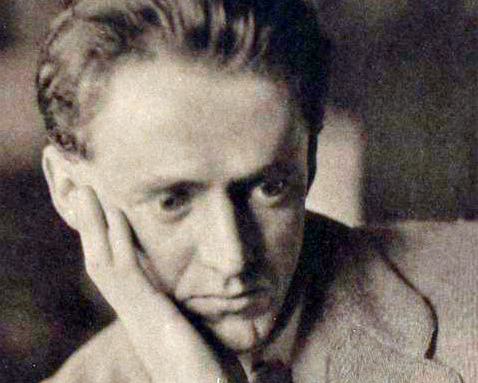OTD in early British television: 29 July 1938

John Wyver writes: The afternoon of Friday 29 July 1938 saw the second presentation of a new half-hour opera, Nocturne in Palermo. With music by A. Davies-Adams, this was based on a 1924 text by the prolific and rather fascinating poet, playwright, critic and more, Clifford Bax. The producer was Stephen Thomas, who had worked with Bax on productions at the Lyric Hammersmith by Thomas’ mentor, Nigel Playfair.
Blessed with a private income, Bax wrote a considerable number of plays between 1912 and the late 1940s. He was also deeply involved with esoterica and the occult, being a friend and chess buddy of Aleister Crowley for many years. The photo above is a detail of a portrait by Alvin Langdon Coburn, shot on 30 March 1916.
When Nocturne in Palermo was published as a libretto in the autumn of 1924, having been staged earlier in the year with music (although whether this was by Davies-Adams or not is unclear), a critic for The Sportsman went to town, writing of its plotting being concerned with the
bloodless philandering of three men and two women in every possible combination of couples. “Empty as air it is; empty and aimless: and puppets are we,” says the prologue, all too truly. The dialogue hardly contains a good line, and the lyrics are dull. If you like Mr Bax’s thin and academic comedy, if you like this weary and academic artificiality, if you prefer puppets to men and women, well and good.
More than a decade later, the Daily Telegraph critic identified only as ‘W.A.D.’ offered Nocturne in Palermo as an operetta only a slightly more enthusiastic response:
Little by little the problems that confront the televised drama are being tackled, but the production of a new operetta, Nocture in Palermo, last night showed how much more remains to be done.
The Telegraph notice continued:
This operetta, in fancy dress, was interesting to see, but it was far better to hear. One the impression all the time that while the television orchestra was able to do complete justice to the very charming music of A. Davies-Adams, the libretto of Clifford Bax, no doubt equally delightful in itself, was being got across only with some difficulty.
The smallness of the screen still remains an obstacle to any real sense of action; and subtleties of expression can only be appreciated in “close-ups”.
Irene Eisinger’s fine voice was heard to admirable effect; but exactly what was the nature of the intrigue in which she was involved with Alan Bourne Webb, Fergus Dunlop, Stanley Vilven and Elizabeth French was not always easy to follow.
‘E.H.R.’ for The Observer rather agreed, although they praised the ‘charming’ music and wrote that ‘scenery and “pictures” were very good indeed’, but
the effect would have been better if the words of Clifford Bax could have been heard. Perhaps in shows like this we could have a ‘caption’ or two to tell us what the trouble is about.
[OTD post no. 224; part of a long-running series leading up to the publication of my book Magic Rays of Light: The Early Years of Television in Britain in January 2026.]
Leave a Reply